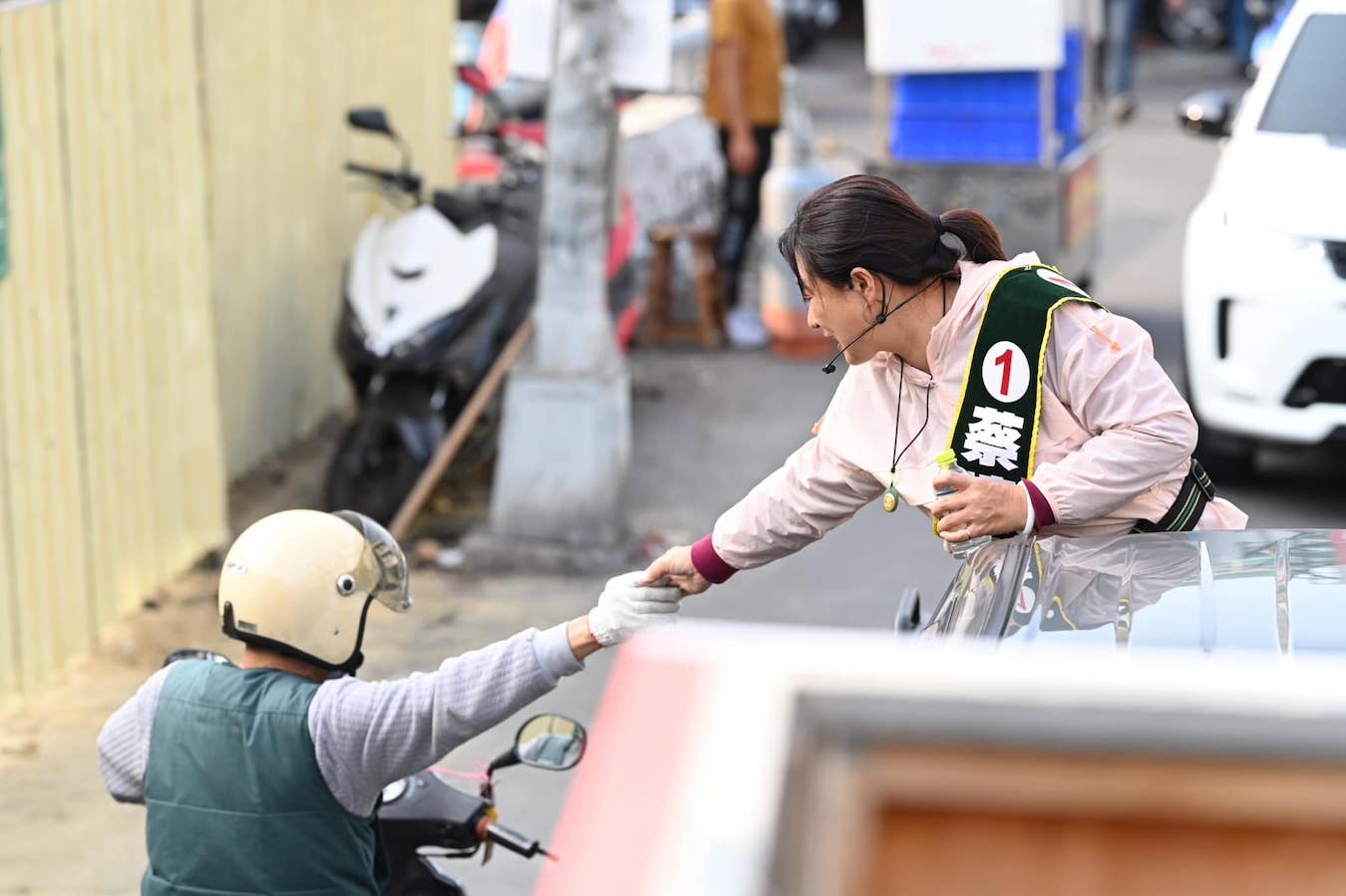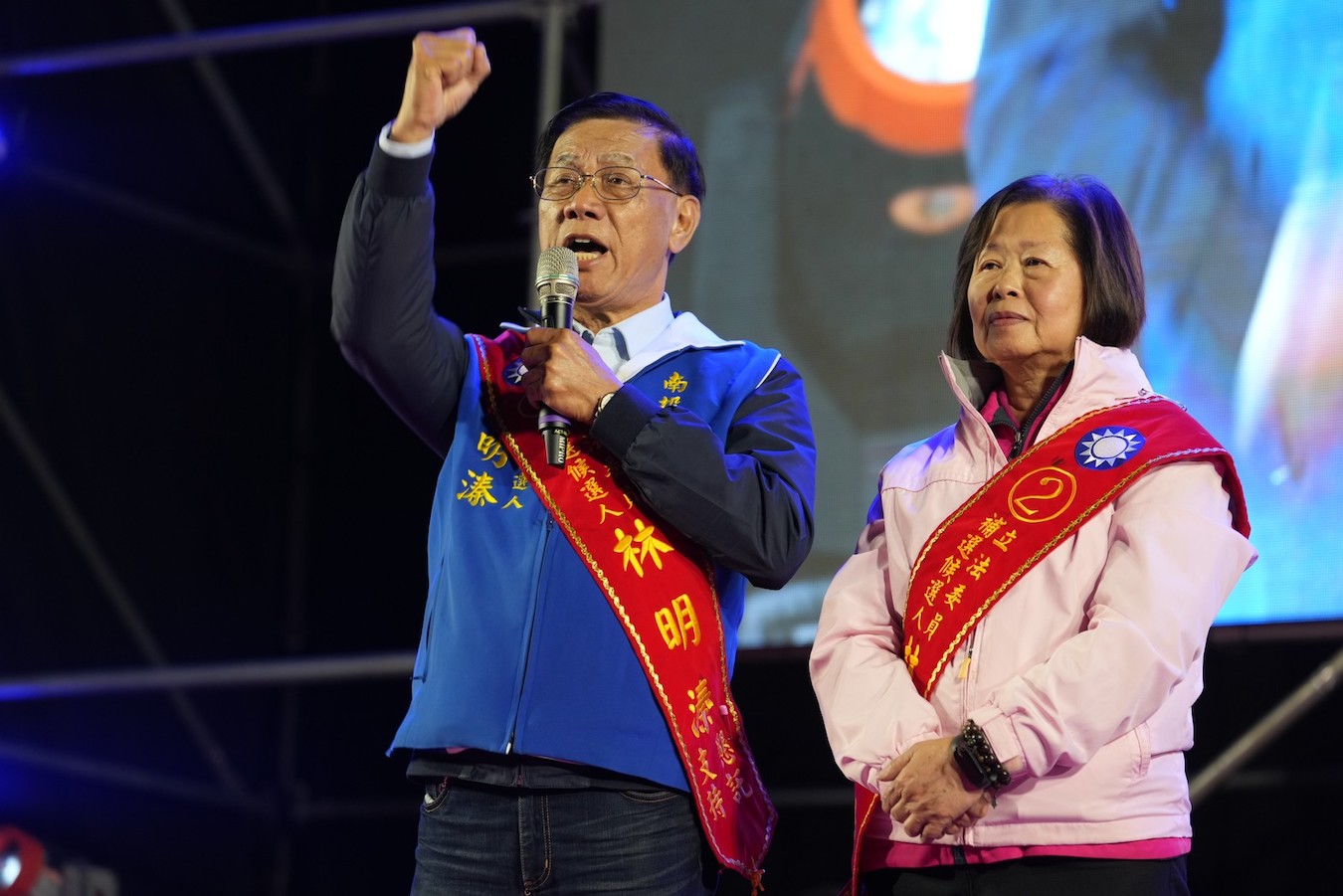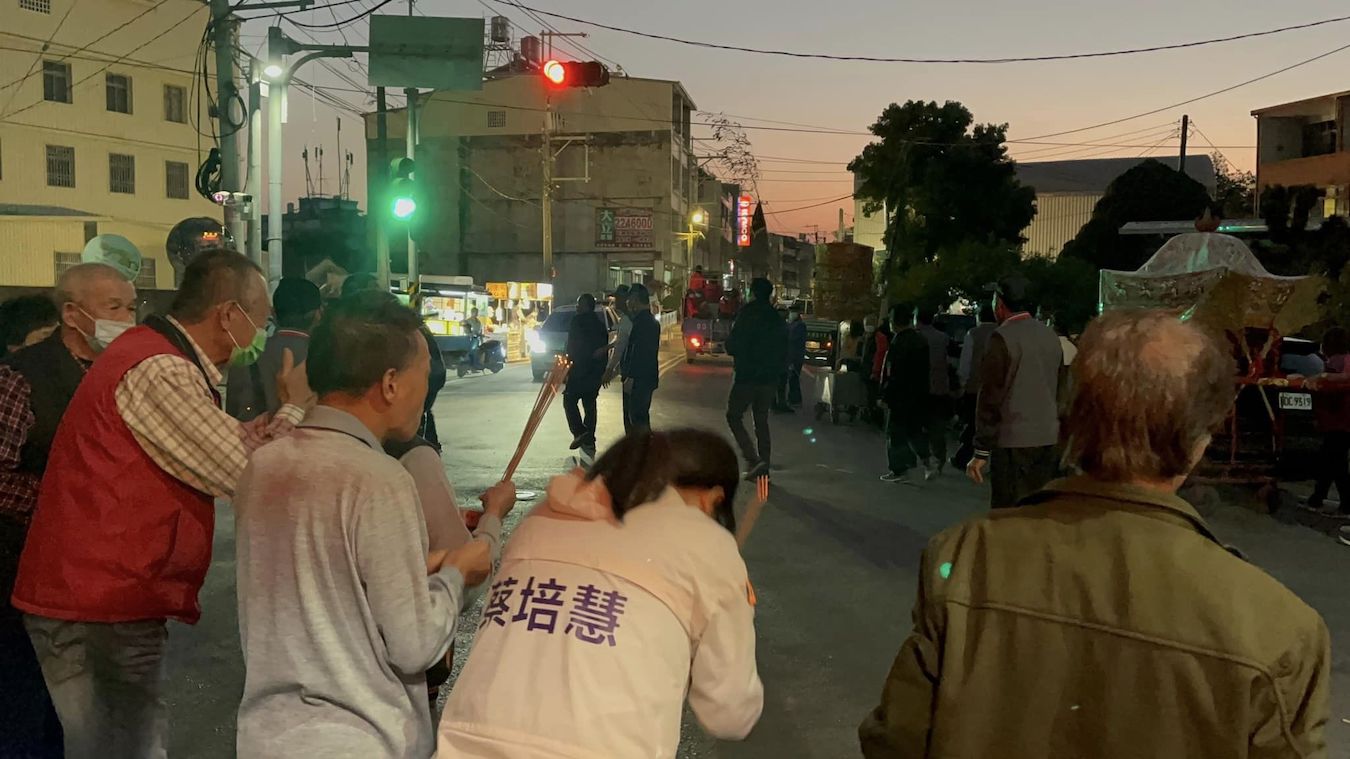by Brian Hioe
語言:
English
Photo Credit: Frida Tsai/Facebook
THE DPP CLAIMED victory in the Nantou legislative by-election over the weekend, with a victory by Frida Tsai over Lin Ming-chen of the KMT. Nantou is traditionally considered pan-Blue territory, as a result of which this is the first time that the DPP has won the legislative seat since the reorganization of the Legislative Yuan in 2008 to have 113 single-member seats. The by-election was to fill the seat vacated by preceding legislator Hsu Shu-hua of the KMT after her victory in the race for Nantou county magistrate in the November 2022 nine-in-one elections.
Tsai, originally a sociologist, has a background in activism as part of the Taiwan Rural Front. The Taiwan Rural Front is known for advocacy for disprivileged rural residents of Taiwan, such as when facing eviction at the hands of the government or from developers, and has been a major player in Taiwanese civil society activism over the last decade. Tsai was particularly active in the demonstrations against forced evictions of farmers and other Miaoli residents by the county government in the years prior to the 2014 Sunflower Movement, which she also participated in.
 Frida Tsai while campaigning. Photo credit: Frida Tsai/Facebook
Frida Tsai while campaigning. Photo credit: Frida Tsai/Facebook
As such, it may not be surprising that the DPP would choose to field Tsai in rural Nantou. Tsai previously served as a legislator from 2016 to 2020 after being named one of the DPP’s party list legislators, as one of the activists that joined the DPP after participation in the Sunflower Movement. Tsai ran for legislator in Nantou in 2020 but was defeated by the KMT candidate and ran for county magistrate in 2022 but was again defeated by Hsu.
Since winning, Tsai has vowed to improve conditions for the elderly in Nantou. This includes by strengthening the hospital system, improving public transport, and improving pensions for the elderly. Tsai also vowed to provide for infrastructure development for science parks and industrial areas.
Even so, Tsai’s victory was by slim margins. Tsai won by 45,218 votes to Lin’s 43,293 votes, winning by 1,925 votes. Turnout was at 46.35%. During the voting, there were allegations of voter intimidation by individuals that put cameras in flower pots to film voters.
The DPP’s victory was achieved by targeting scandals faced by Lin, who had long held political office in Nantou. After serving for eight years as mayor of Jiji from 1993 to 2002, Lin served in the Nantou county council from 2002 to 2006, and then as Nantou legislator for two terms from 2008 to 2014. Lin then was Nantou county magistrate for two terms from 2014 to 2022. In effect, Lin was trading positions with Hsu Shu-hua after the end of the two terms he could serve as the county magistrate.
Yet Lin was further targeted as part of backlash against political dynasties in Taiwan during the election. More specifically, Lin faced scandals over his “princeling” son Lin Ru-bin, who he was accused of seeking to groom for office by creating a “special assistant” position for. To this extent, the younger Lin came under fire for his purchase of a mansion estimated to be worth 26 million NT, though his salary as assistant was 170,000 NT per month, meaning that Lin would have to not eat or drink for 20 years to afford the home.
 Lin Ming-cheng during a campaign rally. Photo credit: Lin Ming-cheng/Facebook
Lin Ming-cheng during a campaign rally. Photo credit: Lin Ming-cheng/Facebook
The senior Lin attempted to defend his son, claiming that he had invested in the home in the name of his son. However, this backlash proves similar to that faced by Yen Kuan-heng, the scion of the Yen political dynasty, in the Taichung 2022 legislative by-election, over a mansion owned by Yen built on protected land. The scandal proved a major contributing factor to the ouster of one of central Taiwan’s long-standing political dynasties.
Otherwise, Lin proved another one of the many politicians in recent memory to face scrutiny over accused plagiarism on his master’s degree. Lin previously was convicted on charges of bribing voters with soy sauce and other gifts in his 2002 bid for county council, resulting in four months in jail, with two years of deprivation of civil rights, and two years probation. Lastly, directly pertaining to policy, Lin was also criticized for failing to build up waste disposal infrastructure in Nantou during his time as mayor, creating more than 200,000 tons of garbage in Nantou.
More broadly, the loss against Lin can be seen as part of backlash against political dynasties in Taiwan, as successfully leveraged on by the pan-Green camp–similar to the Taichung by-election. Apart from his son, Lin hailed from a political family that included former Nantou magistrate Lin Yang-gang, who also served as a Taipei mayor and in various ministerial positions, and Lin Yuan-gang, who also served as Nantou magistrate and as legislator. In this sense, perhaps the results accord with November nine-in-one elections in reflecting a backlash against incumbents, even if the tight race shows that the power of the KMT at the local level is far from broken–the KMT traditionally performs better in local elections compared to the DPP.
The DPP win will prove a morale boost after not only the defeats of 2022 nine-in-one elections, but successive races. This includes the Taipei legislative by-election to fill the seat formerly occupied by Chiang Wan-an of the KMT before his mayoral victory, and the Chiayi mayoral race, which resulted in a victory for incumbent Huang Min-hui of the KMT, but was delayed due to the unexpected death of one of the candidates. Some have credited newly elected DPP chair William Lai, who is expected to be the DPP’s 2024 presidential candidate, for the successful campaign.
It has become increasingly common in the past decade for political parties to invest their entire national political capital into by-elections or referendums and this was the case with the Taipei legislative by-election, the delayed Chiayi mayoral race, and the Nantou legislative by-election. But, importantly, one expects further discord in the KMT as a result of Tsai’s election victory.
 Lin thanking voters for their support after his loss. Photo credit: Lin Ming-cheng/Facebook
Lin thanking voters for their support after his loss. Photo credit: Lin Ming-cheng/Facebook
Namely, while the DPP seems to have consolidated behind Lai in past months, rather than fight internally in a way that could weaken the eventual choice of 2024 presidential candidate, this does not appear to be the case with the KMT. Instead, the KMT is seeing internal contestation between chair Eric Chu, who is thought to want to run for president again despite vowing previously not to do so, and New Taipei mayor Hou You-yi, who is generally thought to be the KMT’s strongest choice of candidate.
Other complications are TPP chair and former Taipei mayor Ko Wen-je’s plans to run for president and FoxConn founder Terry Gou’s seeking to rejoin the KMT in order to participate in the party primaries. Ko may split the pan-Blue vote by running on his own. Gou’s desire to rejoin the KMT presents challenges for Chu, seeing as that Chu will have to bend the rules to allow Gou to once again rejoin the KMT, as he did to try and seek the KMT’s 2020 presidential nomination, yet this may force Chu to open the door for a potential challenger to himself. Chu, who put off making a public announcement on the issue by claiming that he needed to first focus on the Nantou race, will now need to make a decision on the matter.
Though he will not be running, former president Ma Ying-jeou may also have a significant impact on the KMT’s eventual choice of candidate. Ma continues to be a heavyweight in the party, despite the fact that he is increasingly at odds with Chu.
The loss in Nantou for the KMT could potentially weaken Chu’s position, if he is seen as responsible for the loss as party chair. But, in particular, much pan-Blue bloodletting has targeted Hou You-yi for failing to act as a responsible party heavyweight–a “hen”, as the term in Taiwanese political parlance goes–as he is accused of not sufficiently campaigning for Lin. Hou may have viewed Lin’s race as a lost cause and he may have been hoping to avoid political taint by association with Lin, given Lin’s reputation as a politician with links to long-standing political dynasties dependent on nepotistic patronage politics.
 Tsai thanking voters for their support after her victory. Photo credit: Frida Tsai/Facebook
Tsai thanking voters for their support after her victory. Photo credit: Frida Tsai/Facebook
Lin and Hou previously had tense relations over Hou’s failure to lean into campaigning for the KMT’s 2020 presidential candidate, Han Kuo-yu, probably because Hou also did not want to be tainted by association with Han. As a result, Lin publicly lashed out at Hou.
It is possible, then, that the Nantou loss for the KMT will actually damage Hou’s chances of obtaining the KMT presidential nomination. Namely, Hou will be seen as failing to be sufficiently loyal to the party, with Hou also having come under fire in the past because of his perceived closeness to the pan-Blue camp. As Hou tends to adhere to moderate positions on cross-strait relations, deep blues in the party are skeptical of Hou’s loyalty, and this may ultimately hurt Hou’s standing in the party.
Otherwise, it is possible that the loss in Nantou will hurt Ma Ying-jeou’s standing in the party. Lin has criticized Ma for pushing him to run stating that this was a form of personal sacrifice when he intended to originally have his son run as his successor. This is to be seen. Yet the Nantou loss may perhaps be more impactful for the KMT, in furthering internal splits, than the DPP’s losses in Taipei or Chiayi were for the pan-Green camp. Apart from that the DPP was unlikely to win in traditionally pan-Blue Taipei to begin with, the DPP’s reaction to such losses was to consolidate its forces behind Lai, while the KMT’s in-fighting may be worsened by the Nantou defeat.

